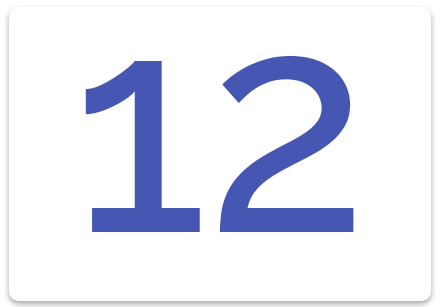Advanced SAT Test Prep Enabled by Innovative Platform Features
Concept Review LessonsBrush up on SAT tested concepts with our tutorials and animated video lessons that cover everything from types of numbers to trigonometric functions. Piqosity dynamically recommends lessons based off of a student’s demonstrated weaknesses. |
 |
Strengths & Weaknesses AnalysisPiqosity continuously updates your estimated test day score after every full-length test and practice set. It also analyzes all practice to provide details on strengths and weaknesses, improvements, and pacing. |
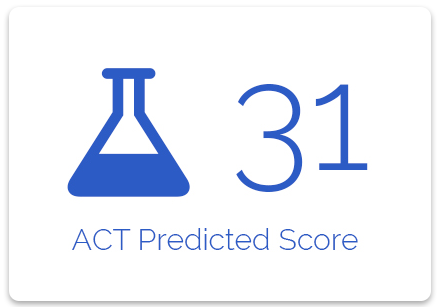 |
SAT Answer ExplanationsEvery full-length SAT test question contains at least 1 explanation. Students may request additional explanations from all educator in our network. |
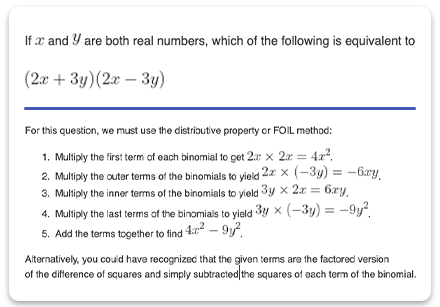 |
Customizable TimerWant to time your SAT test prep? The countdown timer can be set to standard time, time-and-a-half, and double time according to your preferences. |
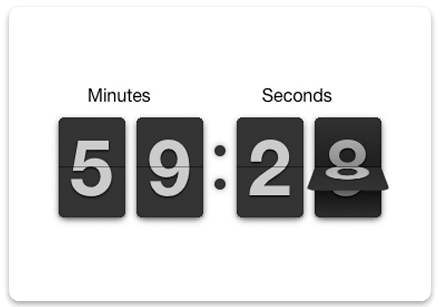 |
Innovative Learning ToolsPiqosity’s student interface includes helpful tools like answer choice strike-throughs, question flagging, and a whiteboard on which to do scratch work. |
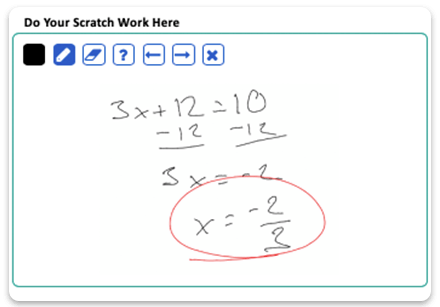 |
Continual GrowthOur global team of software engineers, curriculum editors, and educators is continuously deploying features and updating materials. We generally make behind-the-scenes code updates every two weeks. |
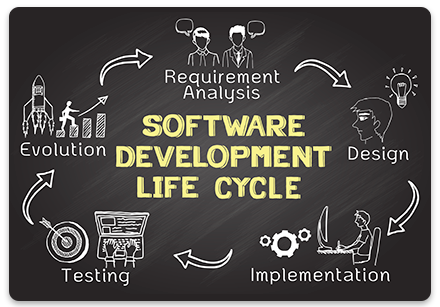 |
Piqosity’s Affordable Pricing for Digital SAT Prep
Digital SAT Course Plans
| On-Track | Honors | Advanced | |
| DSAT Learning Materials | |||
| Mini Diagnostic Test | ✓ | ✓ | ✓ |
| Full-Length PSAT Digital 8/9 Practice Tests | 0 | 2 | 2 |
| Full-Length PSAT Digital 10/11 Practice Tests | 1 | 2 | 2 |
| Full-Length DSAT Practice Tests | 2 | 6 | 12 |
| Personalized DSAT Practice Questions | 150 | 300 | 2,300+ |
| Concept Review Lessons | ✓ | ✓ | ✓ |
| Premium, 11-hour Video Course | - | ✓ | ✓ |
| Intelligent Math Remediation | - | - | ✓ |
| Supplementary Learning Materials | |||
| ACT Advanced Course with 12 Full-Length Practice Tests | - | - | ✓ |
| All English Courses for Grades 5-11 | optional | optional | ✓ |
| All Math Courses for Grades 5-11 | optional | optional | ✓ |
| Key Platform Tools | |||
| Piqosity Virtual Tutor Personalization | ✓ | ✓ | ✓ |
| Dynamic Question Difficulty | ✓ | ✓ | ✓ |
| Score Report & Prediction | ✓ | ✓ | ✓ |
| Strengths & Weaknesses Analysis | ✓ | ✓ | ✓ |
| Gamified & Adaptive Practice | ✓ | ✓ | ✓ |
| 3rd Party Tutor Compatibility | ✓ | ✓ | ✓ |
| Optional Services | |||
| Parent-Tutor Consultation | optional | optional | optional |
| Remote, Online Tutoring | optional | optional | optional |
| One-Time Fee | free | $89 | $149 |
The chart above is for users who sign up directly with Piqosity beginning September 20, 2024.
- No credit card is required to register for the free, On-Track plan.
- All plans include unlimited access for 365 days.
- Lower-tier plans can be upgraded after initial purchase; however, coupons are not applicable to upgrades, and the validity period will not be extended beyond the original purchase date.
Group Pricing for Educators
Discounted, per-student pricing is available to any educator including schools, tutoring companies, teachers, or tutors. Each student license is charged individually depending on the number of active licenses in the educator’s account.
Only one type of plan is available for group discounts–the Advanced Plan.
No application is required; to qualify for group pricing, simply register as an educator or organization, and the discounts will be automatically applied.
The Piqosity Advantage
How to Improve Your Digital SAT Score with Piqosity
Our proven test prep methodology for the last 20+ years.

Learn About the Digital SAT Test
for US college admissions

The Reading and Writing Test is comprised of 2 modules:
- 1st module is normal difficulty taken by all students
- 2nd module is harder or easier depending on performance in first module
- Each module contains 27 passages and 27 questions
The Math Test is comprised of two modules:
- 1st module is normal difficulty taken by all students
- 2nd module is harder or easier depending on performance in first module
- Each module contains 22 questions, 1/3 free response and 2/3 multiple choice
Complementary Courses
English 11
Bundle our 11th grade English course for 100+ more reading passages to practice with.
Algebra II
Bundle our Algebra II math course for 1300+ more questions to practice with.
ACT
Take both an SAT and ACT diagnostic test before deciding on which test to focus your energy.
Frequently Asked Questions
Currently, all of our Math and ELA courses are estimated to take around 40 hours to complete. School is in session for roughly 35 weeks out of the year; assuming a student works roughly 1 hour per week, your Piqosity math course will take the average student a full academic year to complete. Students using Piqosity to remediate or prepare for a standardized test such as the ISEE Lower Level, will likely have to compress this timeline.
Piqosity’s research shows that an average student can expect about a 40 point improvement in SAT score for every 7 hours of quality studying. However, how much you will need to study will ultimately depend on:
- What SAT score do you need/want?
- What is your current SAT Score after taking a diagnostic test?
- What is the gap between your current and desired score?
Additionally the big caveat to this time estimate is the word “quality.” You cannot spend those 7 hours mindlessly watching how-to videos. You must be working through practice tests, learning from your mistakes, and re-learning any basic concepts you’ve forgotten from your math and English classes.
After preparing for the SAT with Piqosity, you’ll see that there’s nothing “mysterious” about this very, standard test. You just need to put in the time and effort to ensure you’re strong in basic skills—like how to identify the main idea of a paragraph or manipulate fractions.
The biggest news about the Digital SAT is that it’s about 30% shorter in both time and questions versus the old, paper SAT. This reduction in size is supposedly enabled by its “adaptive” testing modules.
The Digital SAT is still composed of two sub-tests: Reading & Writing and Mathematics. However, each of these tests is further divided into two modules. All students work the first module. The majority of students then move to module 2a, while the more advanced students will work module 2b. Students will need to answer about 2/3 of module 1 correctly in order to move on to the harder module 2b.
In order to earn a score higher than 1100/1600, students must make it to the hard modules in both the Reading & Writing and Math tests.
Learn more about the differences between the easy and hard SAT modules.
Students can no longer take the paper SAT, as it is being completely replaced by the new, digital version in March 2024. The digital SAT is shorter, adaptive, and involves less reading:
- The digital SAT is only offered on the computer
- The digital SAT is 82 minutes and 56 questions shorter than the paper SAT
- The digital SAT contains 2 standard modules and 2 adaptive modules which can be harder or easier
How does the adaptive module look?
All students work the first module of each test, but the second module is either hard or easy depending on how well they scored on the first module. Students need to answer about 65% of the first module correctly to get to the harder module. Failure to make it to the harder module will cap a student’s potential score to about 550/800.
The PSAT 10/11 is taken by 10th and 11th graders in high school, generally in October. 11th graders use the PSAT 10/11 to compete in the National Merit Scholarship Competition. The PSAT 8/9 is for 8th and 9th grade students as a “pre-pre-SAT.” Both tests are structured exactly like the Digital SAT for college admissions but assess slightly lower-level concepts in math and English.
If you are a 10th or 11th grade student, do not use the PSAT 8/9 as it will be too easy and set unrealistic expectations. If you are an 8th or 9th grader, you can use the PSAT 10/11, but just know that it should be difficult for you given that it assesses math and English concepts, which you may have never seen before.
- The best score on the PSAT is one that places you among the top 1% of test takers in your state, which qualifies you for the designation, “National Merit Semifinalist.” Across all 50 states, the average cutoff score in 2023 was a 214; however, your state could be higher or lower.
- For academically competitive students, a good score on the PSAT is one that places you among the top 5% of all test-takers, which earns you the designation “Commended Scholar”. Generally this score is a selection index of 207 or higher.
- Your PSAT score report will show two primary scores: Total Score and NMSC Selection Index score.
- The Total Score is similar to an SAT score but the range is only a 320 to 1520 instead of 400 to 1600.
- The Selection Index is used to determine your eligibility for a National Merit Scholarship. The Selection Index score is calculated by doubling your Reading and Writing score, adding your Math score, and taking 10% of the sum [(RW × 2) + M] ÷ 10.
Students take the PSAT during school hours in the month of October. The actual date is set by the school where the student is scheduled. Not all schools offer the PSAT, and the ones that do may charge students a fee.
The PSAT is most important for 11th graders, because it allows them to participate in the National Merit Scholarship competition and primes them to get ready for the actual SAT. However, the PSAT is also offered to 8, 9, and 10th graders. The version of the PSAT offered to 8th and 9th graders is different from the one taken by 10th and 11th graders.
- It’s good practice for the SAT and ACT. For the moment, these college admissions tests remain very important for most students and the colleges they’re applying to. The sooner you start preparing, the more likely you are to earn a high score.
- You could win a big scholarship. Students scoring in the top 5% and up may be eligible for National Merit Scholarships. Students scoring in the top 1% may be eligible for scholarships worth hundreds of thousands of dollars in the form of free college tuition, room, board, and expenses!
- Your school told you so. Many high school juniors are required to take the PSAT during school hours. Schools require students to take the PSAT for the reasons above but also because administrators need a clear idea of how their students are performing relative to students at other schools.
The National Merit Scholarship recognizes the top college-bound seniors by PSAT score. “Commended” scholars are the top 5% of PSAT test-takers nationwide. The more prestigious “Semifinalist” scholars are the top 1% of PSAT test-takers in each state. Most Semifinalists go on to become Finalists and are eligible for big scholarships including entirely free tuition, room, and board at major public colleges.
- The PSAT is essentially a practice test for the SAT. About half of juniors nationwide will take the PSAT primarily as a way of qualifying for the National Merit Scholarship program.
- NMQST stands for “National Merit Scholarship Qualifying Test,” which just means that you take the PSAT in order to qualify for the National Merit Scholarship.
Our preparation material for standardized tests like the ISEE, ACT, and SAT go through a rigorous research, writing, and editing process:
- We analyze the test specifications released from the publishers like College Board and ACT.
- We analyze the previously released official practice tests.
- We write our practice tests based off this analysis while citing official practice test questions.
- We edit each question and test for facsimile to the official tests, difficulty, and completeness.
- We peer norm each question with actual students.
- And because 10,000 sets of eyes are still better than our 10 sets, we continuously make improvements from your feedback.
Our brilliant writers scored in the top 1% on these tests, and our Houston-based team of editor/educators has more than 20 years of experience in K12 education. We won’t let you down!
Yes! All of our courses include a free membership level. For test prep courses like ACT, SAT, and ISEE, this free plan even includes access to two, full-length practice tests. No credit card is required to register. If you decide that you want access to more premium content, simply upgrade your plan. Upgraded course plans are single-pay, non-recurring, and provide access for 365-days from the date of purchase.
Yes! Piqosity’s courses are designed to meet your student where they are, and they can be used for both enrichment and remediation. Your child can use Piqosity’s lessons and practice materials to review and reinforce the concepts they are struggling with in class. If they aren’t sure where to start, they can take a diagnostic test to help them understand where their weaknesses lie, or they can use the Piqosity Virtual Tutor to progress through the Course Outline from start to finish.
Every practice set on Piqosity, including adaptive questions and full-length mock tests, can be downloaded as a PDF file for easy printing.
If you upgrade from the free On-Track plan, your credit card will only be charged the one time without automatic, recurring charges. All paid plans are currently valid for 365 days from the date of activation. No credit card is required to create a free account at Piqosity.
Piqosity means to pique curiosity. We are a Houston-based education technology startup on a mission to rethink education. One product launch at a time, we are on a journey to democratize education publishing, personalize student learning, and empower future generations to tackle the greatest challenges. Our team has more than 18 years of tutoring and test prep experience since we first helped our first student out of a Rice University dorm room in 2003. Click here to learn more about our company.
Yes! We are actively looking for educators and publishers to contribute to our platform. Please contact us for more information.
Yes, Piqosity offers online private tutoring for ISEE, ACT, SAT, PSAT, plus math and English. We provide tutoring directly and in partnership with local tutors and companies. Click here to learn more.
Piqosity works hard to make our platform as straightforward and easy-to-navigate as possible. If you are experiencing issues, please visit our support center for immediate answers to most questions, including how-to guides for students and educators, as well as a list of known technical issues. You can also contact us via support ticket any time or call us at +1 713-234-6098 within business hours.
Piqosity’s online classes are suitable for many different types of self-directed learners. Whether you’re a student looking for additional \ enrichment and test prep outside of the classes or are simply looking for a little remediation, Piqosity’s courses provide you with the tools and resources you need to meet your goals.
However, online learning is not for everyone. Students who struggle to focus on the computer may find that classroom learning is better suited to their needs.
As always, it’s free to sign up with Piqosity’s Community Plan, which provides you with limited access to premium content. The paid plan unlocks all of Piqosity’s key innovative platform features, including:
- Instructional lessons with multiple variations including videos
- Adaptive practice including the option for gamification
- Student analytics and strengths and weakness diagnostics
- Answer explanations from both the original author and third-party educators
- Printable PDF practice tests and question sets
- Timers with settings for time and a half and double time
- Online test taking tools like whiteboard, question scratch throughs, and flagging
Register now to get started!
Piqosity does not provide tutorial services. However, we do partner with independent, third-party educators across the world. Some of our course packages include a consultation or tutorial session with these tutors and teachers.
Yes! We built Piqosity not only to be user friendly for parents and students at home but also for the advanced needs of tutors and teachers. Key features for educators include:
- Student management including the ability to see everything the student sees
- Automatic scoring and analysis of all student work
- Assignments with due dates
- Custom Branding (tutoring companies and schools)
The biggest features for educators are still yet to come. Beginning this fall we will open up our platform to enable any qualified educator to upload their own instructional content to Piqosity. This means that educators will be able to create their own lessons and questions. They will be able to share this content with all users or just with their own students.We are actively looking for educators and publishers to contribute to our platform. Please contact us for more information.
Our content is partly written in-house and partly by third party publishers including tutors and teachers. Our in-house team has more than 15 years of experience helping thousands of students achieve their potential at our home base in Houston and around the world.
Our content is aligned to both Common Core and Texas Essential Knowledge and Skills (TEKS). We and our partners also write content in accordance with our experience and the specifications set forth by the test makers (i.e. ACT, College Board, and ERB).
All courses are available for a full 365 days after the date of purchase.
Piqosity is not an accredited institution and does not offer course credit. We do not currently offer certificates of completion at this time, but are working towards doing so in the near future.
Yes! Every practice set on Piqosity, including adaptive questions and full-length tests, can be downloaded as a PDF file for easy printing.
Most college-bound high schoolers will take the SAT in the spring of their junior year. Doing so gives students more opportunities to retake the exam and improve their score, if desired. Visit College Board site for updates regarding dates and deadlines for the SAT.
The digital SAT is typically offered seven times a year, and students can take it often as they want:
- Late August
- Early October
- Early November
- Early December
- Early March
- Early May
- Early June
Normal registration closes approximately 4 weeks before the test date.
Learn more about this year’s SAT Test Dates here.
The digital SAT is comprised of 98 questions and lasts 2 hours and 14 minutes under standard timing.
How many questions are on the SAT?
The 98 questions on the digital SAT are divided between 4 modules—2 each in Reading and Writing test and 2 each in Math test. The number of questions and time allotted is the same between both of the modules in each test. However, the content in the second, adaptive module may be harder or easier depending on how you scored in the first module.
- Reading and Writing Module 1 – 27 questions and 32 minutes
- Reading and Writing Adaptive Module 2 – 27 questions and 32 minutes
- Math Module 1 – 22 questions and 35 minutes
- Math Adaptive Module 2 – 22 questions and 35 minutes
A good digital SAT score for most students is a 1200 or higher, while a 1400 or higher is the minimum good score to apply to a selective college.
- A 1200 means your score is better than about 75% of your classmates, which is good for mildly competitive colleges
- A 1400 means your score is better than about 90% of your classmates, which is the minimum for a selective college
What is an average SAT score?
The average SAT score changes every year. According to the 2021 College Board report, the average SAT score for the class of 2023 was 1028. Keep in mind that the digital SAT scores could be slightly different but probably not significantly since the scoring methodology is unchanged.
What is a perfect SAT score?
A perfect score on the SAT is a 1600. This would require a perfect 800 on both the Math and Reading/Writing sections, which are scored on a scale of 200 to 800.
Learn more about this issue with our in-depth article exploring What is a Good Score on the SAT?
You can retake the SAT as many times as you want; colleges will usually only look at your highest score, and most high achieving students will take the SAT at least twice. However, we strongly encourage you to take your final SAT exam at least 6 weeks before your college application deadlines.
Keep in mind that early decision deadlines are typically November 1st and 15th, and standard deadlines generally begin in January. This means that if you are a senior applying for early decision, your last chance to take the SAT is the October administration date of your senior year; for standard deadlines, your last chance is the December administration date.
The digital SAT is typically offered seven times a year:
- Late August
- Early October
- Early November
- Early December
- Early March
- Early May
- Early June
Normal registration closes approximately 4 weeks before the test date.
The biggest differences between the digital SAT and the ACT are:
- The SAT is purely computer-based whereas the ACT is offered both online and in paper
- The SAT is over 1 hour and 100 questions shorter than the ACT
- The SAT tested math is a lower-level, and there’s no science section compared to the ACT
These top three points seem like a clear win for the newly launched digital SAT. However, the digital SAT is so new (only launching in March 2024) that there are bound to be some pitfalls such as:
- You might prefer a paper test
- The extra time and questions on the ACT might give you more of an opportunity to do better
- You might simply prefer the way that ACT questions are structured
Our experience working with thousands of students over the last 20 years is that fewer than 5% of students will score significantly different on the SAT vs the ACT. We doubt this statistic will change with the digital SAT, so don’t fret if your school requires you to take one test over the other.
Both the digital SAT and the ACT test core concepts from Math, English, and Data Analysis. Even though the SAT doesn’t have a dedicated science test, it does have “quantitative evidence” questions which are not too dissimilar. They are both peer-normed tests (you’re scored in comparison to your classmates).
Top colleges like Harvard, Princeton, and Stanford could not care less which test you take (so long as you do well); both the ACT are nearly universally accepted at US colleges. The ACT and SAT go back and forth between which exam is technically more popular when counted by completed tests; depending on the year, the ACT and the SAT each test between 1.7 and 2.2 million college-bound seniors.





